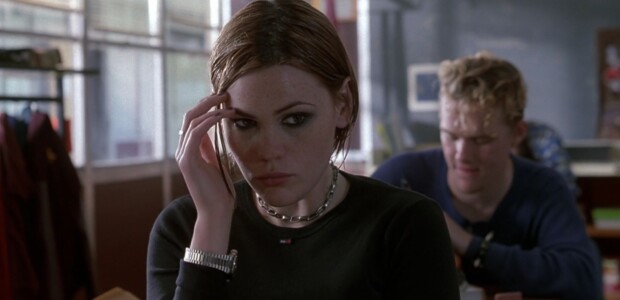Most characters don’t make it out alive in horror movies. Some survive until the final reel if they’re lucky, while others become bodies on the slab before the titles have even run! They are sacrifices for us bloodthirsty fans, but there’s more to them than that. They have wants never met. Stories never properly finished. In Always the Final Kill, Never the Final Girl, writer Matt Konopka digs up these poor souls lost under the shadow of heroes to give them the proper attention they deserve.
Zip on back to the first time you watched Robert Rodriguez’s film about conformist alien parasites taking over a high-school, THE FACULTY. The queen alien has just been taken out by Elijah Wood and a handful of caffeine pill dust. Our makeshift band of teen protagonists has won. Goth sci-fi nerd and indisputable badass Stokely (Clea DuVall), shares a kiss with new boyfriend/ex-high school quarterback, Stan (Shawn Hatosy). But wait. Something’s off. Rather than the stylish all-black wardrobe she was wearing before, Stokely dons a light purple cardigan and whatever else is in season at Abercrombie. She’s suffered the same fate as Ally Sheedy in THE BREAKFAST CLUB, transformed from a human with personality into your basic girl next door. Pretty. Dull. Non-threatening. The way society (and Hollywood) seem to like it. You throw your hands up in the air, screaming “Justice for Stokely!”
At least, that’s how I reacted.
Now, you might say, “But this is a column about characters who died. Stokely didn’t die.” Ah, but what if she did? What if they all did?
In the end, Stokely has shed her gothic attire for a look that society deems “presentable.” Her body may not have perished, but who she is as a person does. While certainly debatable, the implication here is that the aliens have won. Don’t believe me? Consider this: We often reference THE BREAKFAST CLUB as an example of Hollywood’s long history of “prettification” when it comes to women that don’t meet the beauty standards of the patriarchal world we live in. Writer Kevin Williamson knows this. And he’s a writer that always writes with intent. So, with how closely THE FACULTY’s finish compares to that of John Hughes’ film, it seems the clever scribe intends for us to feel the frustration of the similarities. Once again, the goth girl doesn’t get the guy until she emerges from her “unattractive” shell a beautiful butterfly. This is the transformation the aliens wanted all along.
Throughout THE FACULTY, Stokely battles the norms being pushed on her in the guise of head cheerleader, Delilah (Jordana Brewster). Popular. Pretty. “Normal.” She’s everything that society tries to tell Stokely she isn’t. It must be next-level maddening for our outspoken hero that her crush is dating the cruel cheerleader. A microcosm of the way women are urged to compete with each other for who’s prettiest. What does the average Hollywood movie always tell us? That if you don’t look and act like the Delilahs of the world, then you’re not good enough for the Stans of the world.
Stokely shouldn’t need to change, though. I don’t have to tell you that our differences from one another are what makes us special. The whole teen cast is composed of unique yet struggling characters attempting to break out of the boxes they’ve been sealed in, but it’s Stokely who is so distinctive that she captures the eye of the new girl/queen alien, Marybeth (Laura Harris). A creature that claims it wants to ease our pain by making us like everyone else, she promises “a world without anger, without fear, without attitude.” Our misunderstood hero exists as a direct counter to all of that. Marybeth follows her around and offers to be her lab partner because this girl fascinates her. And you know what? Stokely is fascinating. She is special.
But in this universe, there are always forces attempting to stifle the things that make us stand out. And in teen horror like THE FACULTY, that force is often represented by adults. Marybeth acts as a monstrous metaphor for many things. She is angst. She is loneliness. She is the gnawing feeling that who we are will never be good enough. Yet despite being the big bad of the film, she’s merely the cover for what’s really going on behind the curtain, the refusal of the parents to nurture their kids. In the opening scene, Principal Drake (Bebe Neuwirth) informs the teachers that they won’t be getting the funding they’ve asked for. The football team, however, will get whatever they want, because “that’s what the parents want”. This is a town that cares more about their sports teams than their own children. Education, the arts, hell, their futures…the parents are willing to sacrifice it all for the thrill of winning. The fact that the teens can’t trust them for fear of them having been taken over is merely a metaphor for a universal issue: Most teenagers feel abandoned by adults on the journey to discovering who they are.
It breaks my heart when Stokely says, “I always thought the only alien in this school was me.” Kids like her shouldn’t have to feel this way. But they do. I sure did. Most people made me feel as if I was some sort of space monster over my love of horror. The adults who worried I’d become a serial killer because of my interest in genre movies have no idea of the scars they left on my soul. When you’re different, it feels just like that scene where our heroes walk through the school, all of the teens/potential aliens staring at them. Being unique means always having judgmental eyes on you. As if you’re not the same species, or even from the same planet. More tragic is that when we’re young, we don’t understand that it’s a gift to be different. After all, it’s Stokely’s sci-fi knowledge that gives the kids a fighting edge in the end.
“Aren’t you tired of being something you’re not?” asks Marybeth to Stokely. No. She — we — are tired of being forced to be what everyone wants us to be. Let Stokely be the goth sci-fi nerd. Let Casey be the “geeky Stephen King kid.” Let Stan be the D student if that’s what he wants. “Things sure have changed, haven’t they?” remarks Casey in those closing moments. They sure have. And change can be good. But not when it means stripping away your personality just to “fit in”… or getting taken over by that incessant brain bug that says being like everyone else is the only way to get by. Shut it, brain bug. Don’t make me dust you with caffeine pills.
Tags: Clea DuVall, Columns, elijah wood, High School, Horror, Jordana Brewster, Kevin Williamson, Laura Harris, Matt Konopka, robert rodriguez, Sci-Fi, Shawn Hatosy



No Comments